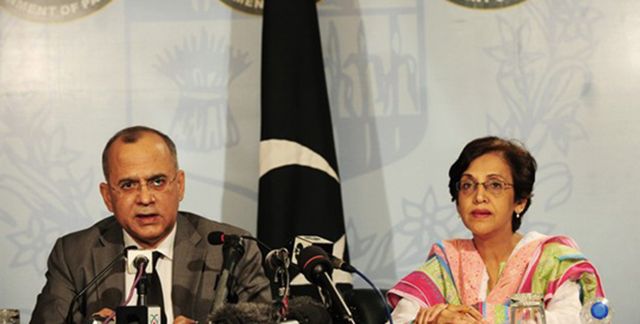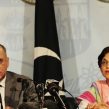
India Pressures Pakistan on Other Terrorist Fugitives after Bin Laden’s Death
Publication: Terrorism Monitor Volume: 9 Issue: 22
By:

The secret U.S. operation in Pakistan’s garrison city of Abbottabad in early May has exposed Pakistan’s terror underbelly. The operation that resulted in the death of Osama bin Laden triggered severe international criticism against Pakistan for allegedly sheltering the al-Qaeda chief for almost six years. In addition, it has amplified existing frictions in Indian-Pakistani relations, particularly those surrounding Pakistan’s alleged role in orchestrating a series of terrorist incidents in India and suggestions that individuals involved in those incidents are, like Bin Laden, taking refuge in Pakistan.
The U.S. operation generated speculation regarding the possibility of neighboring India carrying out similar “hot pursuits” inside Pakistani territory designed to target perpetrators of the November 2008 Mumbai attacks believed to be at large in that country. India’s internal affairs minister, Palaniappan Chidambaram, was the first to react officially, reiterating the long-held Indian view of Pakistan as a “terror sanctuary.” He maintained that the perpetrators of the Mumbai attacks, as well as their controllers and handlers, continue to be sheltered in Pakistan (The Hindu, May 2). His remarks were soon followed by those of Chief of Army Staff General Vijay Kumar Singh and Air Chief Marshal Pradeep Vasant, whose speculation in the local media about India’s capacity to carry out secret operations similar to those of the U.S. Navy Seals prompted sharp reactions from the Pakistan Foreign Office and Army. Pakistani Foreign Secretary Salman Bashir characterized these remarks as “bravado” and cautioned any kind of misadventure or miscalculation from Indian side would result in “catastrophe” (The Hindu, May 6; Daily Times [Lahore], May 5).
Amidst this verbal posturing, the bilateral atmosphere further deteriorated with several exchanges of fire at the international border. A number of ceasefire violations were reported in the Nikowal and Budhwar areas of the Ranbirsingh Pora sub-sector along the border in Jammu/Kashmir on May 14 and 15. Earlier, rockets were fired from the Pakistan side of the border on Indian positions in the Poonch sector on May 5 (NDTV.com, May 15; The Hindu, May 16).
To Pakistan’s anxiety, India carried out a weeklong military exercise code-named “Vijayee Bhava” (Be Victorious) in Rajasthan’s Thar Desert (bordering Pakistan’s Sindh province) to test the operational effectiveness of its army and air force (Times of India, May 10; Daily News and Analysis [Mumbai], May 15). Even though the exercise was planned well in advance, its focus on helicopter-borne troop deployments and rapid mobilization raised eyebrows in the Pakistani establishment regarding its timing and intent.
Pakistan’s Inter-Services Intelligence (ISI) chief, Ahmed Shuja Pasha, reacted sharply, indicating that if India was to emulate the American operation it would invite an appropriate military response. He also added that a contingency plan is already in place for such an eventuality, and that “rehearsals” are being carried out and targets inside India have been “identified” (Dawn [Karachi], May 15).
A guarded India downplayed Pasha’s claim, but nonetheless held a comprehensive security review to take stock of responses in the event of a crisis situation arising out of Pakistan (Hindustan Times, May 17). India also expressed concern regarding the safety of Pakistan’s nuclear arsenal in the wake of frequent terror attacks on its military establishments, especially the May 22 Tehrik-e-Taliban Pakistan (TTP) attack on the Mehran naval base in Karachi that destroyed two PC-3 Orion surveillance aircraft (India Today, May 25). Pakistani investigators have recently alleged foreign involvement in the attack, claiming the attackers used Indian-manufactured transmitters to communicate and were heard speaking Hindi by eye-witnesses (Pakistan Observer, May 26).
During Home Secretary-level talks held on March 28-29, India presented Pakistan with a list of 50 fugitive terrorists it believed were dwelling in Pakistan. Among those on the list were Lashkar-e-Taiba (LeT) founder Hafiz Saeed, Jaish-e-Mohammed (JeM) chief Maulana Masood Azhar, underworld don Dawood Ibrahim, al Qaeda/Harkat-ul-Jihad-al-Islami (HuJI) commander Illyas Kashmiri and Hizbul Mujahideen’s Syed Salahuddin. Significantly, the list also included the names of two serving Pakistani army officers tied to the Mumbai terrorist attack, “Major Iqbal” (a.k.a. Chaudhery Khan) and Major Samir Ali. The list also contains the names of top leaders of the Indian Mujahedeen, though many IM fugitives named in earlier lists were surprisingly dropped in the latest compilation (Indian Express, May 10). To India’s embarrassment, however, its intelligence agencies wrongfully included the names of two individuals who were later found to be in India – one, Feroz Abdul Khan, has been in an Indian prison for 15 months, while the other, Wazhur Qamar Khan, is living in Mumbai on bail (AFP, May 20; Rediff.com, May 21). India has promised to submit a corrected list in two weeks (Economic Times [New Delhi], May 30). The exchange of lists of fugitives has been a regular Indo-Pak bilateral ritual since 2004.
India appears to have seized the opportunity to reiterate its long standing claim that many hardcore terrorists and underworld criminals have been sheltered in Pakistan, though publicly ruling out any military adventures inside Pakistan’s territory. New Delhi has also underscored the issue of terrorist camps inside Pakistan and its claims that Pakistan used U.S. financial assistance to further its rivalry with India (The Hindu, May 28).
Pakistan has been accused of fomenting militancy in the region through rogue elements in its armed forces and in Pakistan’s military intelligence agency, the ISI, which remains a common link among the activities of al-Qaeda, the Taliban, the LeT and a host of terrorist groups nurtured and supported by the agency. In the wake of ongoing revelations by LeT operative David Coleman Headley, it is becoming clear that the ISI provides shelter and covert support for these terrorist organizations to meet its own strategic objectives in Afghanistan and India.
Meanwhile, the United States has also delivered Pakistan a list of five wanted terrorists that includes Osama bin Laden’s deputy Ayman al-Zawahiri, Afghan Taliban chief Mullah Omar, Taliban warlord Sirajuddin Haqqani and al-Qaeda operative Atiya Abdel Rahma (PakTribune [Rawalpindi], May 28).
Many in Pakistan believe that India is trying to capitalize on the deteriorating situation in Pakistan by putting undue pressure on a country already fighting terrorists for its own survival. Despite the embarrassing errors on the Indian list of terrorist fugitives, the delivery of both the Indian and American lists has put Pakistan in a tight spot regarding international perceptions of its anti-terrorist efforts. The onus is now squarely on Pakistan to determine a means of eliminating its growing reputation as a “terror-sanctuary” in the post Bin Laden era and demonstrate some seriousness in fighting terrorists hiding within its borders.





